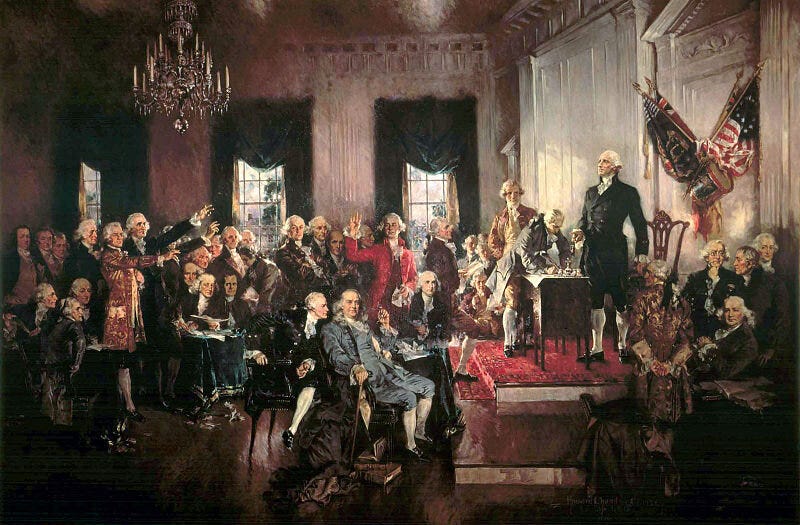The Theory and Meaning of America, Part 3
Did the Ratification of the Constitution Establish a New Nation Apart from that Which Declared Independence in 1776? That's the Question
From the previous installment of this series, Part 2, we understand that the authority for the Congress of the Confederation to consider a new constitution arose from the terms previously agreed under the existing agreement, specifically from articles X and XII of the Articles of Confederation and Perpetual Union (AoC). Also from the last installment, we understand that without authority in place to begin the discussions at the constitutional convention, no authorized actions arising from that assembly could have resulted. But because the outcome of the proceedings were indeed authorized under the the AoC, at least as long as the AoC's provisions were adhered, the results of their actions, a proposed new constitution, and the authority for congress to consider it, carried the sovereign authority of the United States of America, as that nation existed in 1787.
In keeping with its assignment from congress, out of the constitutional convention emerged the final draft of the US Constitution, a document which arrived as a proposal for consideration by the sitting congress operating under the Articles of Confederation. Each member of the congress understood that for the new Constitution to carry authority, the principles of the AoC had to be fulfilled without error. Any new constitution, proposed or ratified without first fulfilling the AoC, would either be null and void, or, if ultimately adopted and followed, would comprise a revolutionary document, equal in stature to the Declaration of Independence, one which would have severed the line of authority back to the Declaration, and canceled the basis of that authority, and begun a new line of authority based upon a new set of reasons. If that were to occur, that action would practically destroy the old nation and the principles on which it stood, and in the process create a new nation, establishing it on new and separate principles.
So if the American Declaration of Independence were to carry authority beyond the ratification of the new Constitution, that ratification had to be done in a manner such that no principles of the sitting agreement between the states be violated. Any violation would have been a breach of contract between and among the states, causing it to become null and void, requiring adjudication in an appropriate court of jurisdiction, which of course under the AoC there was none. So there was no recourse here should a breach occur.
Ratifying the Constitution without a breach of the AoC was not a simple matter. Comparing the two, and with respect to the ratification process, reasonable people could easily construe them written with conflicting language. If these documents in fact conflicted in the manner that one ultimately might properly supersede the other, or if the process that followed did not follow the requirements of both documents, a breach in the flow of authority from the first to the second would result.
Specifically, whereas the Constitution required that its principles would take effect in the ratifying states once nine of the thirteen states ratified, the AoC required that any change to its terms be unanimous, all thirteen must ratify. Today some constitutional scholars argue that a breach in the terms of the AoC did in fact occur during the ratification process, and that therefore there is no line of authority extending from the United States of America, which has operated under the Constitution since 1789, back to the previous USA which operated under the Articles of Confederation, and which operated solely under the principles of the Declaration of Independence prior to that. AND THIS IS THE CRUX OF THE ARGUMENT BETWEEN THOSE WHO ASSERT THAT AMERICA IS NOT A NATION UNDER GOD AND THOSE WHO ASSERT THAT IT IS. If there is no line of authority which demonstrates a clear logical link from the Constitution, back through the Articles of Confederation, and from that point back to the Declaration of Independence, then the nation which exists today is not the same nation that declared independence on July 4, 1776! And if that is true, then that first nation, which no longer exists, and the principles which underwrote its sovereign authority in 1776, are no longer valid. They are dead forever, unauthorized, breached by a lack of adherence to the contract of the AoC as certain states began to operate under the Constitution, a document proposed for ratification in 1787, but not unanimously ratified until 1789. If a breach occurred, then America is NOT a nation under God. In fact it would not be a nation at all, the Constitution displaying no references establishing a new nation to which it might pertain. And to continue to make that argument for breach, and against God in America, and specifically against Christ in America, subverting the truth, much is spent annually by those who believe it is their advantage to do so.
In the next installment in this series, we will begin to uncover what really happened in the ratification process of the Constitution, and whether that set of circumstances constituted a breach of the Articles of Confederation and a breach in the line of authority which extends from the Constitution back to the Declaration of Independence.
Back soon...
Hank





Finally got to parts 1, 2 and 3 today. Well written. I was always under the impression the constitution had dubious authority because, from what I understood, and I am no scholar, the initial discussion of the constitution was illegal because it was carried out in secret, forbidden by the AoC. But I don't know . . .